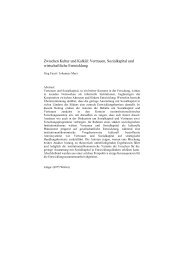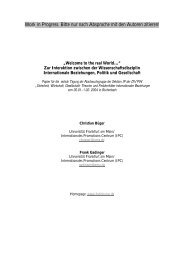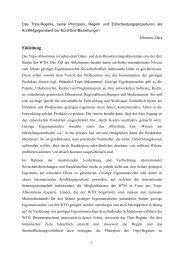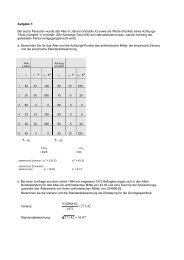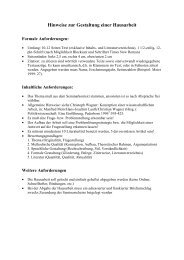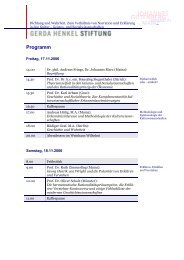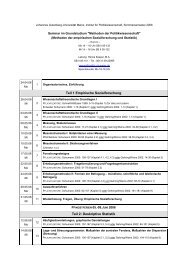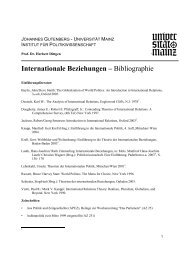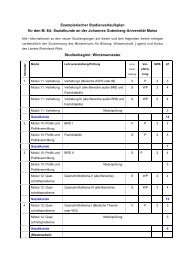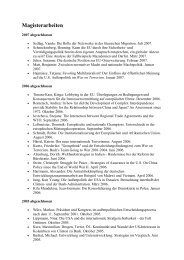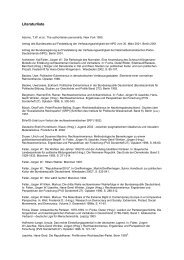Feedback Effects in Foreign Policy: A Framework for Analysis
Feedback Effects in Foreign Policy: A Framework for Analysis
Feedback Effects in Foreign Policy: A Framework for Analysis
You also want an ePaper? Increase the reach of your titles
YUMPU automatically turns print PDFs into web optimized ePapers that Google loves.
Potential feedback effects<br />
general<br />
(positive/negative) <strong>in</strong>tentional<br />
Un<strong>in</strong>tentional<br />
<strong>in</strong>stitutions reproduction /<br />
decay<br />
power<br />
policies<br />
stabilization /<br />
erosion<br />
re<strong>in</strong><strong>for</strong>cement /<br />
modification<br />
self-b<strong>in</strong>d<strong>in</strong>g by <strong>in</strong>stitutional<br />
design or discard<strong>in</strong>g ties by<br />
contribution to <strong>in</strong>stitutional<br />
decay<br />
<strong>in</strong>creas<strong>in</strong>g leverage by<br />
accumulat<strong>in</strong>g power and<br />
wealth<br />
ga<strong>in</strong><strong>in</strong>g support <strong>for</strong> own<br />
policies<br />
22<br />
self-b<strong>in</strong>d<strong>in</strong>g by<br />
<strong>in</strong>stitutional evolution<br />
discard<strong>in</strong>g of ties to oneself<br />
(and others) by<br />
contribution to <strong>in</strong>stitutional<br />
decay<br />
<strong>in</strong>creas<strong>in</strong>g or decreas<strong>in</strong>g<br />
own leverage through the<br />
distributional<br />
consequences of own<br />
policies<br />
accidentally ga<strong>in</strong><strong>in</strong>g<br />
support or provok<strong>in</strong>g<br />
opposition through<br />
consequences of own<br />
policies<br />
5 Clos<strong>in</strong>g the loop: How to analyze <strong>for</strong>eign policy on the agency-level?<br />
What has been presented so far is a view of feedback effects which systematically excludes<br />
the analysis of agency. Us<strong>in</strong>g the tools of structural IR theory we can discover certa<strong>in</strong> typical<br />
feedback dynamics. Whether they occur <strong>in</strong> any actual case, however, crucially depends on<br />
how the actors <strong>in</strong>volved deal with the structural dynamics. In this section we will there<strong>for</strong>e<br />
open the toolbox of agency-oriented theory and survey the concepts it offers to analytically<br />
deal with the role that actors have <strong>in</strong> clos<strong>in</strong>g the feedback loops <strong>in</strong> <strong>in</strong>ternational relations.<br />
FPA is certa<strong>in</strong>ly the most obvious context <strong>in</strong> which tools <strong>for</strong> an agency-based analysis<br />
have been developed. However, we will <strong>in</strong> this section also look <strong>in</strong>to agency-based<br />
approaches that have developed <strong>in</strong> sociological and constructivist research which has only<br />
loose connections to FPA. We divide our <strong>in</strong>ventory <strong>in</strong> two parts. On this basis we can then<br />
exam<strong>in</strong>e how the tools of agency-based approaches could be comb<strong>in</strong>ed with those of<br />
structuralist accounts <strong>in</strong> analyz<strong>in</strong>g feedback effects.<br />
In the first part we look at rationalist accounts of agency <strong>in</strong> <strong>for</strong>eign policies.<br />
Rationalist accounts focus primarily on the domestic and personal constra<strong>in</strong>ts which<br />
rationally calculat<strong>in</strong>g agents face. This l<strong>in</strong>e of argument is pursued by the bulk of FPA<br />
research. This starts with the classic works <strong>in</strong> FPA, <strong>in</strong>clud<strong>in</strong>g the research on <strong>for</strong>eign policy<br />
decision-mak<strong>in</strong>g (Snyder/Bruck/Sap<strong>in</strong> 1962), on bureaucratic politics (Allison 1971), on<br />
groupth<strong>in</strong>k (Janis 1982), and on <strong>in</strong>dividual cognitive-psychological restrictions (George 1969)



